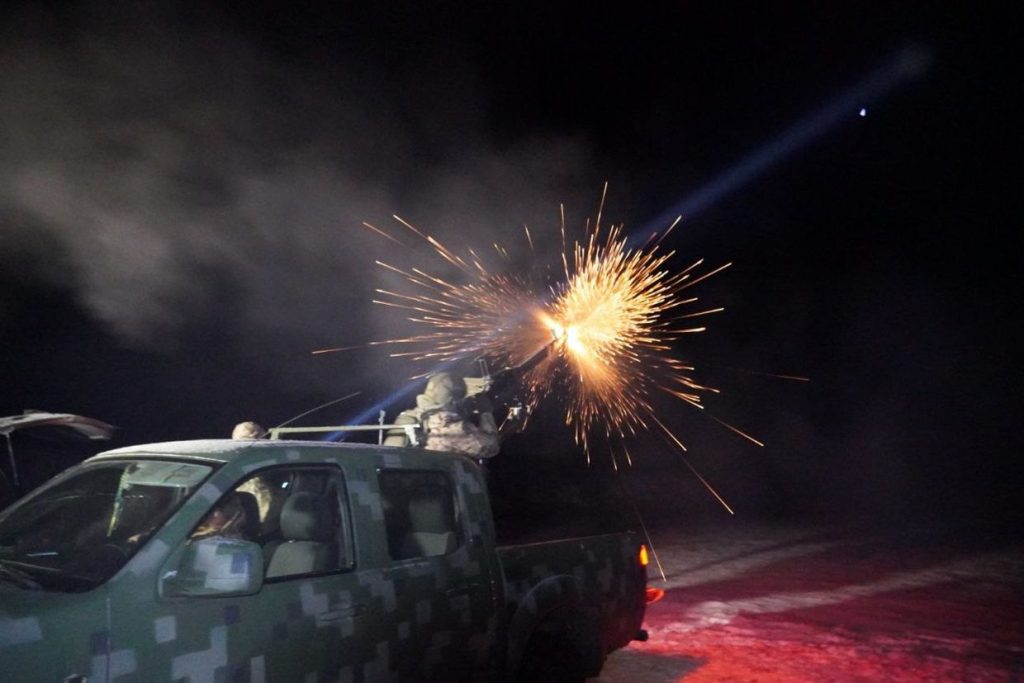Ukraine successfully shot down nine out of ten Shahed-type attack drones launched by Russia overnight on April 2. The drones were launched from Cape Chauda in occupied Crimea, but were repelled by mobile fire groups over Dnipropetrovsk Oblast. The debris from the drones caused two fires in the city of Dnipro, damaging a two-story building and a fire unit. Additionally, an energy facility in Kirovohrad Oblast was attacked by Russian drones and caught fire. However, there were no reported casualties in either oblast. These drone attacks are part of daily occurrences in Ukraine, affecting various regions across the country. Moscow has intensified its missile and drone strikes against Ukraine’s critical infrastructure in recent days, targeting energy facilities in multiple attacks.
On April 1, key developments in the conflict included Russia destroying almost all energy infrastructure in Kharkiv, as reported by the mayor. Authorities also revealed that Russia had used five Zircon hypersonic missiles against Kyiv. Analysts from the Institute for the Study of War (ISW) suggested that Russia may focus its potential offensive in one operational direction rather than spreading its forces. A poll indicated that most Ukrainians believe they understand the situation in the conflict, suggesting a high level of awareness among the population. These developments highlight the ongoing intensity of the conflict and the impact it is having on various regions in Ukraine.
In response to the continued attacks, Ukraine’s Air Force Commander Mykola Oleshchuk reported on the successful interception of Russian drones launched from occupied Crimea. The mobile fire groups were able to repel the attack in Dnipropetrovsk Oblast, preventing further damage and casualties. The attacks on energy facilities in different oblasts underscore the strategic importance of these locations in the conflict. The intensified missile and drone strikes by Russia show the increasing sophistication and scale of the attacks, targeting critical infrastructure across the country. The ongoing conflict continues to pose challenges for Ukraine as it defends against these attacks.
The escalation of the conflict has led to heightened tensions and increased attacks on critical infrastructure in Ukraine. The use of drones and missiles by Russia demonstrates the technological capabilities of the aggressor and the challenges faced by Ukraine in defending against such attacks. The daily occurrences of drone attacks in various regions of the country illustrate the widespread impact of the conflict on civilians and infrastructure. The response by Ukrainian forces, including successful interceptions and repelling of attacks, shows the determination and resilience of the country’s military in the face of aggression. The conflict continues to evolve, with new developments and challenges emerging regularly.
As the conflict in Ukraine continues, support for independent journalism in the country becomes increasingly important. Reporting on the ongoing attacks, developments, and impacts of the conflict is crucial for ensuring transparency and accountability. Joining the fight for independent journalism in Ukraine can help provide accurate information and updates on the situation on the ground. By supporting media outlets that prioritize unbiased reporting and cover the conflict in depth, individuals can contribute to the understanding and awareness of the ongoing crisis. This support is vital in upholding the principles of press freedom and ensuring that the voices of those affected by the conflict are heard and represented.
In conclusion, the conflict in Ukraine persists with ongoing attacks on critical infrastructure and civilian areas. The use of drones and missiles by Russia poses significant challenges for Ukraine, but the country’s military continues to defend against these attacks with determination and resilience. Support for independent journalism is crucial in providing accurate information and updates on the situation, as well as highlighting the impact of the conflict on civilians. By standing in solidarity with Ukraine and supporting media outlets that prioritize unbiased reporting, individuals can contribute to the fight for press freedom and the dissemination of crucial information in these turbulent times.















